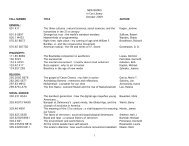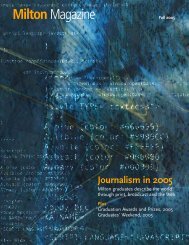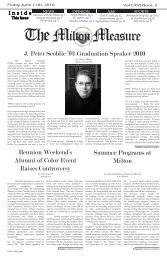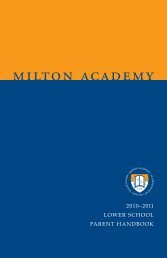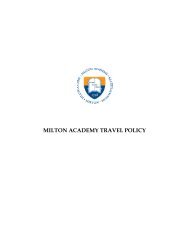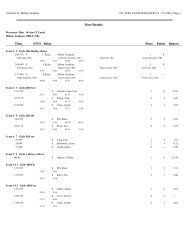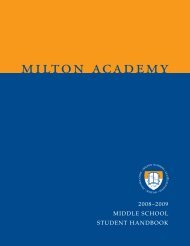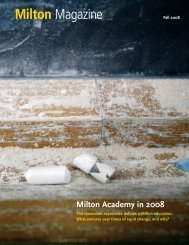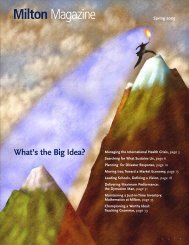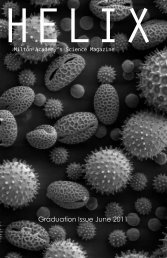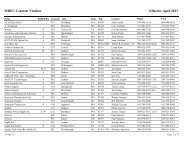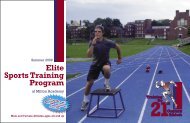Spring 2007 - Milton Academy
Spring 2007 - Milton Academy
Spring 2007 - Milton Academy
- No tags were found...
Create successful ePaper yourself
Turn your PDF publications into a flip-book with our unique Google optimized e-Paper software.
Perry Gift, continuedHistorians, writers, artists, religious and scientific thinkersare among <strong>Milton</strong>’s fall visitors to campusThose moments draw you in,like the first line or last line of anovel.“The piece seems alive. It imitatessomething that is moving,growing. All the things includedare gestural: for example, theblue cups are spinning up andspinning down. The work looksat ‘behavior’ in objects. At thebottom, for instance, the circlesgather like bees around trash.It’s as if the objects have somemotivation.“The white structure is all fabricated.I could have left it thatway, I suppose, but to the fabricatedthings I added real objects.The piece is more complexbecause of the interplay of thetwo.“The interplay between fabricatedand real relates to that question:What is the line betweenreal life and art? Why is thisobject valuable to us—becauseof its aesthetic importance or itspractical value? The levels, forinstance, are both decorative andpractical. I want to blur the lines.“In terms of sculptural properties,I’m interested in instability.When you’re doing art as yourlife’s work, your major ideashave to come from some personalspace and from reflectingupon your time. In our time, theonslaught of information and thespeed of change create a senseof constant instability. We can belulled into a sense of safetybecause of things like theprogress in medicine, but thensomething we couldn’t be preparedto handle happens, reinforcingthe lack of predictabilityor stability in our world.”CDEBill McKibbenEnvironmentalist and best-sellingauthor of The End of Nature andEnoughMr. McKibben visited campusSeptember 13 as a guest of thescience department. He is ascholar in environmental studiesat Middlebury College, has beena staff writer at The New Yorkerand is a contributor to manypublications, including The NewYork Review of Books, Outside andThe New York Times. His majorconcerns include global warming,alternative energy andhuman genetic engineering.In his book The End of Nature,McKibben writes, “In the past,we spoiled and polluted partsof…nature, inflicted environmental‘damage.’ But…deep down, wenever really thought we could[wreck nature]: it was too big andtoo old; its forces…were toostrong, too elemental. But, quiteby accident, it turned out that thecarbon dioxide and other gaseswe were producing in our pursuitof a better life could alter thepower of the sun, could increaseits heat. And that increase couldchange the patterns of moistureand dryness, breed storms innew places, breed deserts...Wehave produced the carbon dioxide—weare ending nature.”Mr. McKibben’s new book,Deep Economy: The Wealth ofCommunities and the DurableFuture, is due to be released thisMarch.Paul WatanabeUniversity of MassachusettsDepartment of Political ScienceDr. Paul Watanabe knows firsthandof the Japanese internmentthat took place in the UnitedStates following the Pearl Harborbombing. He recalls that hisbrother, only five days old at thetime, and mother were sent to anassembly center—essentially aformer horse stall at the SantaAna racetrack in California—andlater to an internment camp inthe early 1940s. For <strong>Milton</strong> students,he traced the history ofthe internment initiative. Thequestion of that time is the questionof today, he said. “What isthe right balance between preservingcivil rights and protectingnational security?”Dr. Watanabe, <strong>Milton</strong>’s ninthannual speaker in the HongKong Distinguished LectureSeries, visited campus onOctober 4 and posed that question.He compared Americans’response to Arab Americans followingthe September 11 tragedyto the response toward JapaneseAmericans during World War II.“When someone, because ofhis race, religion, or ethnicity isheld in suspicion,” Dr. Watanabeconcluded, “we all potentiallybecome the victims of suspicionsourselves. Aren’t we all diminishedand damaged in some significantway when other people’ssense of self, identity and dignityare compromised?”Lorrie MoorePrize-winning author of Birds ofAmerica and other works;University of Wisconsin’sDelmore Schwartz Professor inthe HumanitiesLorrie Moore visited campus onNovember 1 as this year’sBingham Visiting Writer. Ms.Moore read her story “Dance inAmerica,” answered students’questions, and continued herconversation in Straus Library.David Smith, English departmentchair, introduced Ms.Moore by imploring students tolisten intently to her words.“…What I don’t want you to overlook…isthe richness, whether ofhumor or of compassion or ofnuanced insight.” Ms. Mooreexplained that the parent/childbond—which is one subjectbroached in “Dance in America”and throughout her work—issomething that she has “beeninterested in from the beginning.”She explained, “It’s such abasic plot line in our lives thatit’s hard to write about peoplewithout at least a little of that.”Ms. Moore’s fiction, reviews andessays have appeared in suchpublications as The New Yorker,The Paris Review and BestAmerican Short Stories.50 <strong>Milton</strong> Magazine



